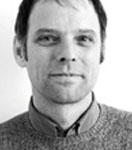
Design has the power to
enable behaviours.
-
PS:We’ve seen design move away from exclusively marketing towards ‘design-thinking’ in previously unthought fields. At what point is a designer over-reaching?
-
JCZ:
Design is an interdisciplinary undertaking. For me the designer could be the person who also runs an NGO, a healthcare nurse or an urban planner. So my contribution would be amongst this group of co-designers. I have some capabilities in a methodical approach to foster the development of an idea or concept. I have capabilities to manage the idea generation and I have a capability to communicate that better. But at the same time, I am seldom a subject matter specialist. So I need to be a good listener and I really need to know what I can’t do. I need to know where the ethical boundaries are. That’s a starting point for anyone.
-
PS:Does design do more harm than good?
-
JCZ:
Yes! Design has contributed to the onslaught of products. Design since the 1930s has been actively used as a marketing agent. Design has contributed to a waste of advertising, over designed products, or products that have so many features we don’t know how to utilize them. There’s a real challenge to return to the roots or what a user actually desires. That’s very important. Design has a big impact on the way desires are produced and managed and are fulfilled. We need to re-think how we want to live in the future.
